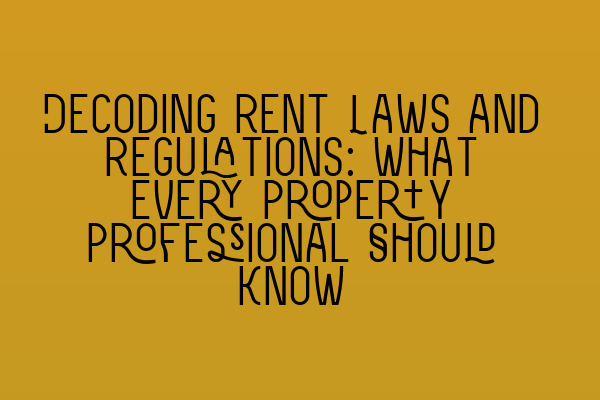Decoding Rent Laws and Regulations: What Every Property Professional Should Know
As a property professional, understanding the intricate web of rent laws and regulations is essential to providing excellent service to your clients and ensuring compliance with the law. Rent laws vary from country to country and even from region to region, making it crucial to stay updated on the specific regulations that apply to your area. In this article, we will break down the key aspects of rent laws and regulations that every property professional should know.
Rent Control Laws and Regulations
One of the most significant aspects of rent laws is rent control. Rent control laws aim to protect tenants from excessive rent increases and provide stability in the rental market. These laws typically set limits on the amount landlords can increase rent annually, restrict evictions without just cause, and regulate security deposit requirements. If you operate in an area with rent control laws, it’s crucial to understand the specific rules and requirements to avoid legal issues with your clients.
Click here for more information on SQE 1 Practice Exam Questions.
Tenant Rights and Responsibilities
Tenant rights and responsibilities play a significant role in rent laws and regulations. Property professionals must have a solid understanding of what tenants are entitled to and what they are expected to comply with. Common tenant rights include the right to a safe and habitable living environment, privacy, and proper notice for rent increases or evictions. On the other hand, tenants also have responsibilities such as paying rent on time, maintaining the property in a reasonable manner, and complying with lease terms and property rules.
For more information on SQE 1 Practice Mocks and FLK1 FLK2, click here.
Lease Agreements and Contractual Obligations
Lease agreements form the foundation of the landlord-tenant relationship and outline the rights and obligations of both parties. As a property professional, it is essential to understand lease agreement requirements and ensure that they comply with the relevant laws and regulations. This includes understanding the necessary elements of a lease agreement, such as the term of the lease, rent payment terms, and maintenance responsibilities. Additionally, property professionals should be aware of potential pitfalls and common issues that may arise in lease agreements, such as illegal provisions or unfair terms.
Eviction Laws and Procedures
Eviction laws and procedures are another crucial aspect of rent regulations. In cases where tenants fail to comply with lease terms, landlords may need to initiate eviction proceedings. It is vital for property professionals to have a comprehensive understanding of the eviction laws and procedures in their area to guide their clients properly. This includes knowledge of the grounds for eviction, the legal process for eviction, and any specific notice requirements.
To learn more about SQE 2 Preparation Courses, click here.
Security Deposits and Repairs
Security deposits are a common practice in rental agreements and serve as protection for landlords against any potential damage or non-payment by tenants. However, there are strict laws and regulations governing the handling of security deposits. Property professionals must be well-versed in the laws regarding security deposits, including the maximum amount that can be charged, the timeline for returning the deposit, and the proper procedures for documenting damages and deductions.
Hiring an Expert
With the complexities of rent laws and regulations, hiring a solicitor who specializes in property law can be a wise decision for property professionals. An expert solicitor can provide valuable advice and guidance, ensuring that you and your clients navigate the legal aspects of rental properties successfully. Furthermore, staying updated with relevant training courses, such as SQE 1 Preparation Courses, can enhance your knowledge and skills in property law.
For the latest SRA SQE Exam Dates, click here.
Conclusion
Understanding rent laws and regulations is paramount for property professionals to guide their clients effectively and avoid legal complications. Rent control laws, tenant rights and responsibilities, lease agreements, eviction procedures, and security deposit regulations are just a few of the critical aspects to consider. By staying informed and continuously learning, property professionals can provide an exceptional level of service and ensure compliance with the law in the dynamic rental market.
